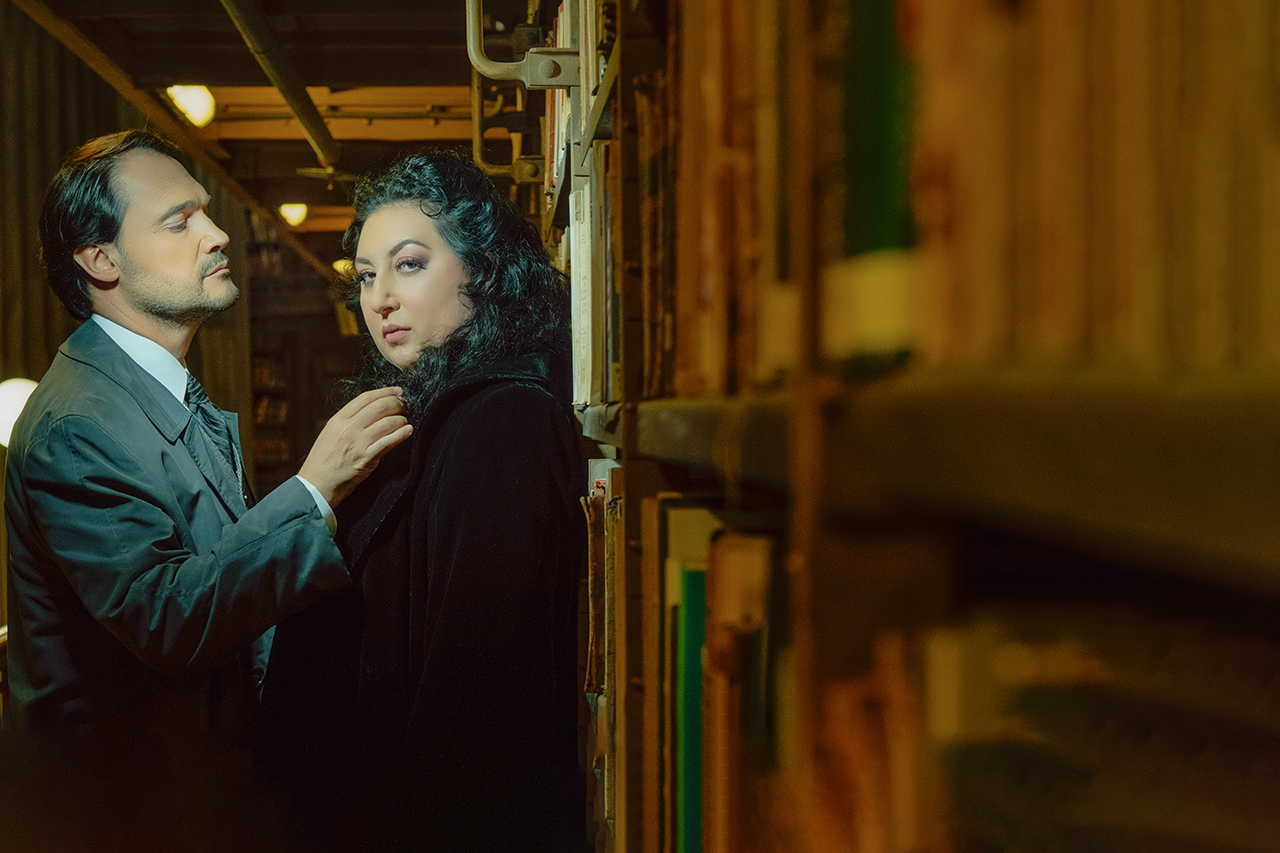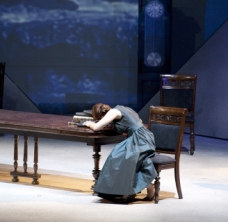Production sponsor

�
The Greek National Opera presents a major production of global importance. Jules Massenet's Werther, directed by the late, great Spyros A. Evangelatos, is bringing the greatest mezzo-soprano of our times -Anita Rachvelishvili- to the Greek National Opera, where she will be tackling the role of Charlotte for the first time in her career. Conducting is the internationally renowned Canadian maestro Jacques Lacombe, while performing the title role is the great Italian tenor Francesco Demuro. From 23 March 2023 and for six performances inside the Stavros Niarchos Hall at the Stavros Niarchos Foundation Cultural Center. This production is made possible by a grant from the Stavros Niarchos Foundation (SNF) to enhance the GNO's artistic outreach.
�
Werther by Jules Massenet -one of the most popular operas in the French repertoire- was written around a century after the epistolary novel by Goethe upon which it is based. The opera tells the story of a doomed love affair between the young Werther and Charlotte. When it dawns on Werther that there is no hope for their love, he takes his own life. Charlotte, who has realised the urgency of the situation, rushes to be by his side, reaching him a little before he breathes his last.
Just like Goethe's Faust (which in opera form became best known in the version by Gounod), so too did Werther win over the opera world, set to music by Jules Massenet, the great French composer. Massenet's opera -which skilfully captures both the poetic nature of the idealistic Werther and the prisoner to social convention that is Charlotte- enjoyed huge success in its own day; translated into numerous languages, the work would go on to influence everything from the mores to the fashions of its time.
This operatic Werther follows the beat of its own drum, departing from the original text in crucial ways. While it retains the theme of challenging social hierarchies and received convention, it dispenses in large part with the work's philosophical musings. The fate of Goethe's hero inspired the French composer to pen a score of immense lyricism and remarkable sensitivity that does not lack for powerful dramatic outbursts. Through it, he dives deep into the psyches of the lead characters, crafting vivid personas. As the opera progresses and the focus of the work shifts from the simple pleasures offered by family life and social life to the emotional lives of the two protagonists, so the music follows - going from delineating their outer, public likenesses to rendering their complex and dark inner worlds.
�
This production of Werther, first presented in 2014 at the Olympia Theatre, was the last opera to be directed by Spyros A. Evangelatos, a legendary figure in Greece's theatre and opera scenes.�Spyros A. Evangelatos -son of the great Greek composer and conductor Antiochos Evangelatos- served as the GNO's Artistic Director and Chair of the Board for many years and, alongside his extensive work in the theatre, directed a series of famous operas by Verdi, Bizet, Puccini, Rossini, Mozart, Britten, and others to great success. His staging is being revived here by the director Ion Kessoulis.
The production's sets and costumes were created by another leading figure of the contemporary arts scene in Greece: the unforgettable set and costume designer for theatre, opera, and film George Patsas. His set and costume designs are being revived here by Tota Pritsa.
Conducting is the internationally renowned Canadian maestro Jacques Lacombe, who has conducted Werther at the Metropolitan Opera in New York, in Vancouver, in Nice (France), at the Théâtre des Champs-élysées in Paris, and elsewhere. Lacombe -who has been described by the New York Times as �gifted and ambitious�- has conducted many of the most important symphonic orchestras in Europe and America, and has collaborated with such major opera houses as the Royal Opera in London and Deutsche Oper Berlin, as well as the Canadian Opera Company and opera houses in Marseille, Monte Carlo, Munich, Avignon, and Philadelphia, to name but a few.
Performing the title role is Francesco Demuro, who thrilled audiences in the GNO's recent production of Rigoletto at the Odeon of Herodes Atticus. Demuro, one of the most sought-after tenors across Europe and America, has carved himself an impressive career at the world's most major opera houses, appearing on such stages as La Scala in Milan, the Metropolitan Opera in New York, the Royal Opera in London, Opéra national de Paris, the Vienna State Opera, the San Francisco Opera, Teatro Real in Madrid, Deutsche Oper Berlin, the opera houses of Florence, Naples, Hamburg, Munich, and Frankfurt, and elsewhere.
Making her highly anticipated debut in the role of Charlotte is the great mezzo-soprano Anita Rachvelishvili - �the best Verdi mezzo-soprano today on the planet,� as the conductor Riccardo Muti noted in a New York Times article titled �A Young Singer Takes the Opera World by Storm�. Rachvelishvili, a true star of the opera world, has been charting herself a remarkable course, appearing at the world's most major opera houses to great success, and drawing rave reviews from the biggest media outlets across the globe. Since making her historic debut at La Scala in Milan on the invitation of Daniel Barenboim, Rachvelishvili has managed -in the space of a decade- to distinguish herself on an international level through her imposing and powerful stage presence, her astounding vocal qualities and fullness, her exceptionally carefully considered role choices, her utter professionalism, and her complete dedication to the operatic arts. Following her first thrilling appearance in Greece in July 2018, as part of the GNO's production of Carmen, she has forged a close partnership with the Greek National Opera, returning to Athens in 2020 for a historic concert performance inside the Roman Agora watched online by an audience of more than a million around the world, and again in 2021 to perform in the GNO's All Star Verdi Gala at the Panathenaic Stadium, appearing alongside Anna Netrebko, Yusif Eyvazov, and Dimitri Platanias.
Also appearing in the production are Nikos Kotenidis as Albert, Yanni Yannissis as the Baillif, Nicolas Maraziotis as Schmidt, Marinos Tarnanas as Johann, Ioannis Kontellis as Brühlmann, Chrissa Maliamani as Sophie, and �mily Tsimidaki as K?tchen.
Konstantina Pitsiakou is chorus mistress of the GNO Children's Chorus.
Werther at a glance
The composer: The French composer Jules émile Frédéric Massenet was born on 12 May 1842. Taking his first piano lessons with his mother, he was accepted to study at the Paris Conservatoire at the tender age of 11. When his parents moved out of the city, Jules stayed behind to continue his studies, living with friends and supporting himself by working as a percussionist at the Théâtre Lyrique. In 1862, he won the prestigious Prix de Rome. His first opera was produced in 1867, but it was his dramatic oratorio Marie-Magdeleine that drew particular praise from such composers as Tchaikovsky, D'Indy, and Gounod. The composer Ambroise Thomas, who wrote the opera Mignon, and the music publisher Georges Hartmann were both great champions of his work. He garnered the highest honours early on in his career, and was elected to the Institut de France at the age of just 36 - its youngest member. He would go on to compose more than 30 operas, among which Hérodiade (1881/84), Manon (1884), Werther (1892/93), Tha?s (1894/98), and Don Quichotte (1910) stand out as highlights. He died in Paris in 1912 after a long battle with cancer.
The work: A drame lyrique in four acts, Werther is based on a libretto by édouard Blau, Paul Milliet, and Georges Hartmann that in turn draws on the epistolary novel by Johann Wolfgang von Goethe titled Die Leiden des jungen Werthers (The Sorrows of Young Werther - 1774).
Premieres: The work had its world premiere at the Vienna Court Opera (Hofoper) on 16 February 1892, where it was performed in German. Its first presentation in French followed soon after, in Geneva on 27 December 1892. The opera would enter the GNO's repertoire on 4 January 1962, presented at the Olympia Theatre with a libretto translated into Greek by the composer Georgios Sklavos, and conducted by Totis Karalivanos.
�
�
Synopsis
Act I / Wetzlar in Germany, July 1780. The widowed Baillif is teaching his youngest children a Christmas carol. Charlotte dresses for a ball. Since her fiancé, Albert, is away on a trip, she is to be escorted there by Werther, who arrives as Charlotte is preparing supper for her younger siblings, just as their mother did before she died. The pair leave together for the ball. Albert returns, unexpectedly, from his trip. Unsure of Charlotte's intentions, and disappointed not to find her home, he is reassured and consoled by her younger sister, Sophie. Albert leaves, promising to return next morning. Werther and Charlotte return from the ball late that night. Werther realises that he has fallen for Charlotte, but news of Albert's arrival prevents him from confessing his feelings to her. Charlotte recalls how she promised her dying mother that she would marry Albert. Werther is left in despair.
Act II / Three months later. Charlotte and Albert are now married. We find them walking happily to church, followed by a disconsolate Werther. Sophie tries to lift his spirits. When Charlotte comes out of the church, he speaks to her of their first meeting. Charlotte begs him not to try and see her again before Christmas Day. Werther contemplates suicide as Charlotte consoles Sophie, who cannot comprehend Werther's strange behaviour. Albert realises that Werther is in love with his wife.
Act III / Christmas Eve. Charlotte is home alone. She spends time rereading the letters Werther sent her. Suddenly, Werther appears and -as he reads her the lines of a poem- she realises that she loves him too. They embrace for a moment, but Charlotte immediately regains control of herself and sends him away. Albert returns to find his wife distraught. A message arrives from Werther, asking Albert to lend him his pistols as, he explains, he is going away on an extended trip. Charlotte has a terrible feeling about this and rushes off to find Werther. There follows an orchestral intermezzo that leads straight into the final act.
Act IV / Werther lies mortally wounded in his room - Charlotte has arrived too late to stop him. She consoles Werther by declaring her love for him. He asks for her forgiveness. Upon his death, Charlotte faints. The sound of children singing the Christmas carol can be heard coming in through the window.
�
�















